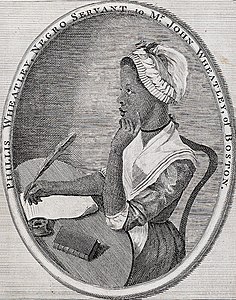Analysis of To The Right Honourable William, Earl Of Dartmouth, His Majesty's Principal Secretary Of The State For North-America,
Phillis Wheatley 1753 (West Africa) – 1784 (Boston)
HAIL, happy day, when, smiling like the morn,
Fair Freedom rose New-England to adorn:
The northern clime beneath her genial ray,
Dartmouth, congratulates thy blissful sway:
Elate with hope her race no longer mourns,
Each soul expands, each grateful bosom burns,
While in thine hand with pleasure we behold
The silken reins, and Freedom's charms unfold.
Long lost to realms beneath the northern skies
She shines supreme, while hated faction dies:
Soon as appear'd the Goddess long desir'd,
Sick at the view, she languish'd and expir'd;
Thus from the splendors of the morning light
The owl in sadness seeks the caves of night.
No more, America, in mournful strain
Of wrongs, and grievance unredress'd complain,
No longer shalt thou dread the iron chain,
Which wanton Tyranny with lawless hand
Had made, and with it meant t' enslave the land.
Should you, my lord, while you peruse my song,
Wonder from whence my love of Freedom sprung,
Whence flow these wishes for the common good,
By feeling hearts alone best understood,
I, young in life, by seeming cruel fate
Was snatch'd from Afric's fancy'd happy seat:
What pangs excruciating must molest,
What sorrows labour in my parent's breast?
Steel'd was that soul and by no misery mov'd
That from a father seiz'd his babe belov'd:
Such, such my case. And can I then but pray
Others may never feel tyrannic sway?
For favours past, great Sir, our thanks are due,
And thee we ask thy favours to renew,
Since in thy pow'r, as in thy will before,
To sooth the griefs, which thou did'st once deplore.
May heav'nly grace the sacred sanction give
To all thy works, and thou for ever live
Not only on the wings of fleeting Fame,
Though praise immortal crowns the patriot's name,
But to conduct to heav'ns refulgent fane,
May fiery coursers sweep th' ethereal plain,
And bear thee upwards to that blest abode,
Where, like the prophet, thou shalt find thy God.
| Scheme | AABBCDEEFFGHIIJJJKKLMNNOPQQRSBBTTUUVWXXJJYZ |
|---|---|
| Poetic Form | |
| Metre | 1101110101 1101110101 0101010101 1011101 0111011101 1101110101 1011110101 0101010101 1111010101 1101110101 11010101010 1101110001 110110101 0101010111 1101000101 11010101 1101110101 1101001101 11011110101 1111110111 1011111101 1111010101 110101101 1101110101 11111101 110100101 110101101 11110111001 1101011101 1111011111 10110111 1111110111 011111101 10111101101 11011111101 111010101 1111011101 1101011101 11010101001 11011111 1100111101001 0111011101 1101011111 |
| Closest metre | Iambic pentameter |
| Characters | 1,866 |
| Words | 329 |
| Sentences | 9 |
| Stanzas | 1 |
| Stanza Lengths | 43 |
| Lines Amount | 43 |
| Letters per line (avg) | 35 |
| Words per line (avg) | 8 |
| Letters per stanza (avg) | 1,487 |
| Words per stanza (avg) | 328 |
Font size:
Submitted on May 13, 2011
Modified on March 05, 2023
- 1:44 min read
- 100 Views
Citation
Use the citation below to add this poem analysis to your bibliography:
Style:MLAChicagoAPA
"To The Right Honourable William, Earl Of Dartmouth, His Majesty's Principal Secretary Of The State For North-America," Poetry.com. STANDS4 LLC, 2024. Web. 7 May 2024. <https://www.poetry.com/poem-analysis/29395/to-the-right-honourable-william%2C-earl-of-dartmouth%2C-his-majesty%27s-principal-secretary-of-the-state-for-north-america%2C>.


Discuss this Phillis Wheatley poem analysis with the community:
Report Comment
We're doing our best to make sure our content is useful, accurate and safe.
If by any chance you spot an inappropriate comment while navigating through our website please use this form to let us know, and we'll take care of it shortly.
Attachment
You need to be logged in to favorite.
Log In